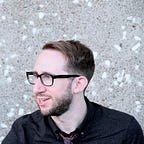It’s complicated.
Just 30 days ago, I was setting foot in the Middle East for the first time. As someone who has always learned more through experience and story than through fact and data, I struggled with how to understand the place I would be going and frankly had no expectations — a blank slate.
I was invited to spend a week in Israel as part of REALITY Storytellers, with an itinerary carefully curated by the Schusterman Foundation and masterfully guided by Michael Baeur (sidenote: if you don’t believe me about the master part, read this). So I figured “why the schmuck not!?”
It was totally eye-opening (and not just because of the daily ~8 AM — 2 AM marathon of activities). Having been raised in a fairly anti-Semitic Catholic ghetto (hi Boston!), I simply had not experienced a culture where the majority of people have Jewish roots. I could actually feel decades old shame giving way to slowly gestating pride.
But Israel is perplexing. There were many moments when this conflict zone didn’t feel like one at all. Between adrenaline filled ATV rides made possible by jovial staff and wine-filled farm-to-table meals hosted by Israel’s culinary elite, it was easy to forget where in the world I was. And then reality set in (along with a healthy dose of realizing my own naivete). While adventure guides and sommeliers talked over the sound of bombs from the Syrian border, the uneasiness of the unaccustomed became increasingly obvious. It’s hard not to feel conflicted in these situations, but the extent to which so many people go on living out their passions, without being crippled by fear, was revealing. I thought a lot about how people face fear as individuals and collectively; as well as what it means to grow up as a country in fear…
It’s complicated.
I felt honored to spend a week with incredible and accomplished speechwriters, journalists, filmmakers, authors, speakers, actors and communicators (we danced a lot). And still, I couldn’t wait to be released from the comfortable but awkward grip of arranged meals, transportation and hotels. As soon as the program ended, I took a taxi straight to the Arab world, first visiting the West Bank and then venturing further into Jordan.
My one West Bank night was beautiful and cautious. When violence broke out in Nablus, my visiting teacher friend and I retreated to eat hummus and sleep, vowing to explore the old city just after sunrise. It was eerily quiet as the markets opened and Palestinian military gathered. We narrowly missed a protest, and I got in a van to the border, learning only the Arabic word shukran for “thanks.”
After a Palestinian van ride to the border and an Israeli bus ride from it, I met two close friends of my father’s for whom I had questions. My dad passed away from cancer in 2012, and I’ve been working on a film called Finding Groovopolis which explores his life through a found screenplay he had co-written while I was growing up. Once back in Jerusalem, I was able to interview my dad’s good friend Amihai who had hosted my father when he was exploring his own roots and spirituality in Israel back in 2000.
Over the course of the trip I also shot a reel (3 minutes) of super 8 film in an attempt to recreate scenes from when my parents went on their honeymoon (they were technically on the Egyptian Nile but I’m hoping some Jordanian and Israeli landscapes may work as stand-ins).
All this to say, I owe a heap of gratitude to the Charles and Lynn Schusterman Family Foundation for the rare chance to make progress on my current film in ways that I had not anticipated possible!
Warning: this part is gonna sound trite. While I won’t forget many of the people I encountered on the trip whom I now consider friends and collaborators, I also believe I will look at people differently in general, even if it’s on that microbial-subconscious-seemingly-forgettable-or-undetectable-by-humans scale. When I was preparing to get out of the van at the Qalandiya border crossing to go back into Israel from the West Bank (concluding a visit that Israelis are prohibited from enjoying), I shuffled around in my pocket for the 6 shekels I owed and passed the coins to the driver. He signaled to me that there was someone in the passenger seat who needed some help. It was an elderly blind man with a cane. So there we went, a 30 year old Portlander and an 80 year old Palestinian with locked arms heading toward the check point together. When we got to the sidewalk, he pointed his cane toward the gate and started turning to go the other way. I verbalized and non-verbalized as best I could to make sure he knew that the checkpoint was ahead. But he raised his head, smiled, turned and started walking in a different direction. Of course he knew where to go; he was simply showing me — the actual blind one — how to get home.
